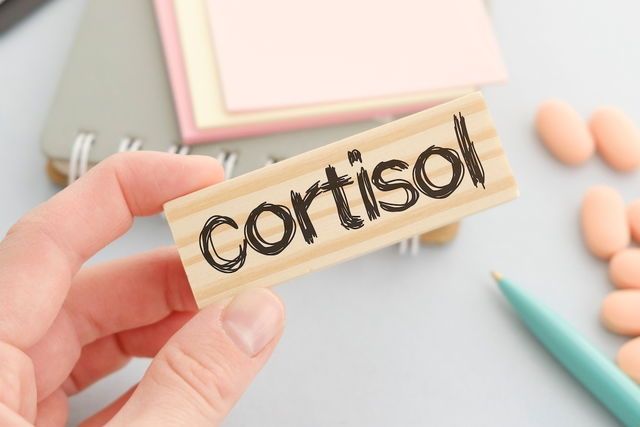Introduction
Do you ever open your eyes in the morning only to feel your heart racing, your mind spinning, or an unexplained sense of dread? You’re not alone. Many people experience morning anxiety, and it often has a root cause that’s overlooked: cortisol spikes.
Known as the body’s stress hormone, cortisol plays a vital role in waking us up and keeping us alert. But when it’s out of balance especially elevated at the wrong time it can trigger physical symptoms of stress and anxiety the moment you wake.
In this article, we’ll explore:
-
What cortisol is and its role in your morning routine
-
Why morning cortisol spikes can cause anxiety
-
The link between lifestyle and cortisol imbalances
-
Natural ways to regulate cortisol for peaceful mornings
What Is Cortisol?
Cortisol is a steroid hormone produced by your adrenal glands, located on top of your kidneys. It’s best known for its role in the “fight or flight” response, but it also plays key roles in:
-
Regulating blood sugar
-
Controlling inflammation
-
Supporting metabolism
-
Managing your sleep-wake cycle
Under normal conditions, cortisol follows a daily rhythm known as the cortisol awakening response (CAR). It begins to rise around 4- 6 AM, peaks around 7- 9 AM to help you feel alert and energized, then gradually declines throughout the day.
Why Morning Cortisol Spikes Can Cause Anxiety
While a moderate rise in morning cortisol is natural, excessive spikes can lead to symptoms like:
-
Racing heart
-
Sweaty palms
-
Nervous energy
-
Restlessness
-
Negative thought spirals
This happens because too much cortisol overstimulates your nervous system, pushing you into a state of hyperarousal as if you’re under attack before the day even starts.
Causes of Excess Cortisol in the Morning:
1. Chronic Stress
If your body is constantly under stress (work, finances, relationships), your cortisol rhythm becomes disrupted. It may rise higher than needed in the morning, mimicking anxiety or panic attacks.
2. Poor Sleep Quality
Inconsistent sleep or insomnia can confuse your circadian rhythm, prompting your body to produce more cortisol to “force” you awake.
3. Blood Sugar Imbalances
Low blood sugar during the night can trigger cortisol release as a compensatory mechanism. If your body feels like it’s starving, cortisol steps in to raise glucose leading to early morning restlessness and anxiety.
4. Caffeine Too Early
Drinking coffee immediately after waking may exacerbate your natural cortisol peak, especially if your cortisol is already high. This can worsen symptoms of anxiousness.
5. Negative Thought Patterns or Anticipatory Anxiety
Waking up already worried about the day ahead? Mental stress can feed into physical stress, leading to even higher cortisol and more intense morning anxiety.
How to Know If Your Cortisol Is Spiking
If you experience any of the following consistently within 30–60 minutes of waking, cortisol spikes could be the culprit:
-
Anxiety or panic without a clear reason
-
Racing heart or palpitations
-
Shaky hands or dizziness
-
Feeling overwhelmed immediately after waking
-
Sweating or stomach upset
-
Waking up earlier than desired and unable to fall back asleep
You can also ask your doctor for a salivary cortisol test to measure your cortisol awakening response.
Long-Term Effects of Elevated Cortisol
If left unbalanced over time, chronically high cortisol levels can lead to:
-
Burnout or adrenal fatigue
-
Weight gain (especially abdominal fat)
-
Insulin resistance and prediabetes
-
Suppressed immunity
-
Thyroid dysfunction
-
Mood disorders like anxiety and depression
So managing cortisol isn’t just about easing morning anxiety it’s about protecting your overall mental and physical health.
How to Naturally Balance Morning Cortisol and Reduce Anxiety
You don’t need medication to fix cortisol imbalances, simple lifestyle shifts can make a huge difference.
1. Create a Calm Wake-Up Routine
-
Avoid your phone for the first 30 minutes
-
Step into sunlight or sit near a bright window
-
Practice deep belly breathing for 3 – 5 minutes
-
Stretch or do gentle yoga to calm the nervous system
2. Eat a Blood Sugar-Balancing Breakfast
Start your day with protein + healthy fat + complex carbs (e.g., oats with nuts and seeds, or eggs with whole-grain toast and avocado). This stabilizes your blood sugar and keeps cortisol in check.
Avoid skipping breakfast or consuming high-sugar foods in the morning.
3. Delay Your Coffee
Instead of grabbing coffee immediately, wait 60- 90 minutes after waking. This gives cortisol time to regulate naturally, without being overstimulated.
If you’re sensitive to caffeine, try herbal teas like ashwagandha, tulsi, or chamomile in the morning.
4. Limit Night time Stimulants
Avoid:
-
Excessive screen time (especially blue light exposure)
-
Heavy meals after 9 PM
-
Alcohol and caffeine in the evening
Prioritize sleep hygiene: go to bed at the same time, keep your room cool and dark, and wind down with relaxing activities.
5. Try Adaptogens
Adaptogens are natural herbs that support adrenal function. Some that help regulate cortisol:
-
Ashwagandha
-
Rhodiola rosea
-
Holy Basil (Tulsi)
-
Licorice root (in moderation)
Always consult a professional before starting supplements, especially if you’re on medication.
6. Journaling or Brain Dump Before Bed
Write down your worries or to-do list before sleeping. This clears mental clutter and reduces the chance of waking up with your brain already in overdrive.
When to See a Doctor
If your morning anxiety is persistent, severe, or affecting your daily life, it’s wise to consult a:
-
Endocrinologist (to test cortisol levels)
-
Psychologist or therapist (to address underlying anxiety)
-
Nutritionist (to assess lifestyle and diet impact on cortisol)
Sometimes, anxiety disorders or hormonal imbalances like thyroid issues can masquerade as morning cortisol spikes.
Conclusion
Waking up anxious isn’t always “in your head.” Your body chemistry particularly cortisol levels- plays a major role in how your mornings feel.
By understanding the connection between cortisol and anxiety, and implementing a few strategic lifestyle habits, you can rewire your mornings to be calmer, clearer, and more in control.


